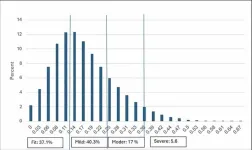(Press-News.org) Strabismus, a misalignment of the eyes that occurs especially in children, has no bearing on intelligence or personality, but animated movies tend to use the condition to signify a villainous, dopey, or clumsy character, according to a new study from researchers at the University of Colorado School of Medicine.
“When animators are figuring out what a character is going to look like, they have to decide on every little detail of that character's appearance, and so it's not by chance that an animated character happens to have strabismus,” says Michael Puente, MD, assistant professor of ophthalmology who focuses on pediatric ocular health. “That's something that the animation team made a deliberate decision to do, and I imagine that they have reasons for that decision.”
“Our study suggests that commonly, the reason that a character is depicted as having strabismus is if that character is unintelligent or undesirable, and that animators see strabismus as a way of visually conveying that undesirable trait,” he continues.
The research, published this month in the journal Pediatrics, analyzed 46 characters from animated 125 films made by Walt Disney, Pixar, DreamWorks and Studio Ghibli, and found characters with strabismus were 14 times more likely to be depicted as unintelligent than intelligent and six times more likely to be followers than leaders.
These depictions, the researchers say, can have harmful effects for children with strabismus by perpetuating stereotypes that can negatively affect a patient’s self-confidence and influence the perception of strabismus by young impressionable audiences.
The role of strabismus in mental development
There are several causes for strabismus, which can look like crossed eyes or one of the eyes drifting toward the ear. For some young patients, the condition can be a sign that they need glasses, but for most it’s a neurological issue where the signals from the brain to the muscles that control the eyes are not calibrated correctly, causing some of the eye muscles to pull too hard or not enough.
Surgery can help address those muscles and is successful about 80% of the time, Puente says. Often, he encounters young patients who ask for the surgery because they are self-conscious about their appearance.
“Every day I have kids that are asking me for surgery, and that says a lot as children tend to be apprehensive of medical care,” he says. “But strabismus often affects these kids so much that they’re asking for a fix. I don’t think there are a lot of other pediatric surgeons that have that experience.”
While strabismus can have impacts on a child's visual development, it also impacts the way that they interact with society, their peers, teachers, and their friends.
“Kids with strabismus, unfortunately get bullied a lot for that difference in appearance,” Puente says. “There have been studies that find that they're less likely to get invited to birthday parties. Kids in school are less willing to sit next to a kid with strabismus. There have been surveys of teachers that have found that teachers tend to assume that students with strabismus are less intelligent, and all this stigma affects the way that children develop psychosocially.”
Trends translating to reality
Negative perceptions in media can contribute and magnify these stereotypes, Puente and his fellow researchers say. They weren’t able to find a single primary protagonist with strabismus, however comic-relief characters or villainous characters with strabismus were common.
Researchers found only three characters that were considered “leaders,” but one was a villain and the other was depicted as “unintelligent.” In 125 films and 46 characters with strabismus, there was only one that was found to be intelligent, the character Forrest Woodbush from Pixar’s The Good Dinosaur.
Puente says he hopes the study can shine a light on how pervasive negative depictions are in media created for children and show animators how it affects young patients.
“If animators recognize that they tend to always portray strabismus so negatively, I hope they can reflect on that and maybe when they have an undesirable character or a bad guy or a ‘dumb’ character, they think twice before giving it strabismus,” Puente says. “It sends a message to their very young, impressionable audience.”
“There are lots of people with strabismus, and it would be great to have some characters with strabismus that could be role models and are portrayed positively,” he continues. “That just doesn’t exist in any of these movies in our study, but I think that would be a really impactful change.”
END
Animated movie characters with strabismus are more likely to be villains, study finds
CU researchers found characters with crossed or drifting eyes are more likely to play more minor roles in animated movies and be considered unintelligent or villainous.
2024-11-12
ELSE PRESS RELEASES FROM THIS DATE:
How retailers change ordering strategy when a supplier starts its own direct channel
2024-11-12
Researchers from Erasmus University and KU Leuven published a new Journal of Marketing study that examines how retailers respond when suppliers establish direct channels to reach end-consumers and how suppliers can take steps to avoid a backlash.
The study, forthcoming in the Journal of Marketing, is titled “How Retailers Change Ordering Strategies When Suppliers Go Direct” and is authored by Michiel Van Crombrugge, Els Breugelmans, Femke Gryseels, and Kathleen Cleeren.
Recently, Sony began selling PlayStation products through its PlayStation Direct online store in the UK, ...
Young coral use metabolic tricks to resist bleaching
2024-11-12
Coral larvae reduce their metabolism and increase nitrogen uptake to resist bleaching in high temperatures, according to a study published November 12th in the open-access journal PLOS Biology by Ariana S. Huffmyer of the University of Washington, US, and colleagues.
High ocean temperatures cause coral bleaching, which results from the disruption of the relationship between corals and their symbiotic algae, an increasing concern as global temperatures rise. However, relatively little research has examined the effects of high temperatures ...
Protecting tax whistleblowers pays off
2024-11-12
AUSTIN, Texas — The federal tax gap — money people and companies owe Uncle Sam but fail to pay on time — has climbed to historic highs: $696 billion in 2022, according to the IRS. It’s money that, if recouped, could fund infrastructure or education or pay down government debt.
One way to collect that money is through lawsuits prompted by corporate whistleblowers — often present or former employees who know a company’s finances and expose its transgressions.
Federal law includes ...
Bioluminescent proteins made from scratch enable non-invasive, multi-functional biological imaging
2024-11-12
Bioluminescence is the natural chemical process of light creation in some living creatures that makes fireflies flicker and some jellyfish glow. Scientists have long been interested in borrowing the secrets of these animals' light-producing genes to create similar effects in vertebrates, for a variety of biomedical applications.
UC Santa Cruz Assistant Professor of Biomolecular Engineering Andy Yeh is designing completely artificial proteins that produce bioluminescence to serve as a non-invasive method for bioimaging, diagnostics, drug discovery, and more. A new paper published in the flagship journal Chem reports on a new series of bioluminescent ...
New study links air pollution with higher rates of head and neck cancer
2024-11-12
DETROIT — A recent study published in the journal Scientific Reports correlates higher levels of pollutant particulate matter to higher occurrences of head and neck aerodigestive cancer.
The article, "Air Pollution Exposure and Head and Neck Cancer Incidence," is the work of a multi-institutional collaboration with researchers from Wayne State University, Johns Hopkins University and Mass General Brigham.
The study was led by John Cramer, Ph.D., associate professor of otolaryngology, and John Peleman, M.D., medical resident in the Department of Otolaryngology, in the Wayne State University School of Medicine. They collaborated with Mass General Brigham, an integrated ...
LSU researchers excavate earliest ancient Maya salt works
2024-11-12
The team was led by LSU Alumni Professor Heather McKillop, who first discovered wooden buildings preserved there below the sea floor, along with associated artifacts, and the only ancient Maya wooden canoe paddle in 2004.
Her key collaborator, Assistant Professor Elizabeth Sills at the University of Texas at Tyler, began working with McKillop as a master’s student and then as a doctoral student at LSU.
Since their initial discovery of wood below the sea floor in Belize, the team has uncovered an extensive pattern of sites that include “salt kitchens” for boiling ...
Building a diverse wildland fire workforce to meet future challenges
2024-11-12
Every year around this time, California’s wildland firefighters hold their breath as hot, dry winds threaten to spread flames across the state. As such conflagrations grow in size and severity throughout the Western U.S., the strain on fire managers has intensified. A new report from Stanford University’s Climate and Energy Policy Program provides a blueprint for fostering a more inclusive, diverse and well-supported workforce to meet the increasing need for fire mitigation and management.
“The wellbeing of the wildland fire workforce has ...
MBARI researchers discover remarkable new swimming sea slug in the deep sea
2024-11-12
MBARI researchers have discovered a remarkable new species of sea slug that lives in the deep sea. Bathydevius caudactylus swims through the ocean’s midnight zone with a large gelatinous hood and paddle-like tail, and lights up with brilliant bioluminescence. The team published a description of the animal, nicknamed the “mystery mollusc,” in the journal Deep-Sea Research Part I.
“Thanks to MBARI’s advanced underwater technology, we were able to prepare the most comprehensive description of a deep-sea animal ever made. We’ve ...
Decentralized social media ‘increases citizen empowerment’, says Oxford study
2024-11-12
Researchers from the Oxford Martin Programme on Ethical Web and Data Architectures (University of Oxford) have reported findings from a paper exploring the motivations and challenges in running decentralised social media such as Mastodon, concluding such platforms offer potential for increased citizen empowerment in this digital domain.
In their study, presented at the 27th ACM SIGCHI Conference on Computer-Supported Cooperative Work & Social Computing (CSCW) today, the researchers interviewed 16 administrators of Mastodon servers (otherwise known as instances), including those supporting marginalised and stigmatised communities. Their ...
Validating an electronic frailty index in a national health system
2024-11-12
“The classification of patients according to their level of frailty allows us to adjust prevention programs and focus our limited resources on the right action for the right person.”
BUFFALO, NY- November 12, 2024 – A new research paper was published in Aging (listed by MEDLINE/PubMed as "Aging (Albany NY)" and "Aging-US" by Web of Science), on October 24, 2024, Volume 16, Issue 20, titled, "Development and validation of an electronic frailty index in a national health ...
LAST 30 PRESS RELEASES:
Brainwaves of mothers and children synchronize when playing together – even in an acquired language
A holiday to better recovery
Cal Poly’s fifth Climate Solutions Now conference to take place Feb. 23-27
Mask-wearing during COVID-19 linked to reduced air pollution–triggered heart attack risk in Japan
Achieving cross-coupling reactions of fatty amide reduction radicals via iridium-photorelay catalysis and other strategies
Shorter may be sweeter: Study finds 15-second health ads can curb junk food cravings
Family relationships identified in Stone Age graves on Gotland
Effectiveness of exercise to ease osteoarthritis symptoms likely minimal and transient
Cost of copper must rise double to meet basic copper needs
A gel for wounds that won’t heal
Iron, carbon, and the art of toxic cleanup
Organic soil amendments work together to help sandy soils hold water longer, study finds
Hidden carbon in mangrove soils may play a larger role in climate regulation than previously thought
Weight-loss wonder pills prompt scrutiny of key ingredient
Nonprofit leader Diane Dodge to receive 2026 Penn Nursing Renfield Foundation Award for Global Women’s Health
Maternal smoking during pregnancy may be linked to higher blood pressure in children, NIH study finds
New Lund model aims to shorten the path to life-saving cell and gene therapies
Researchers create ultra-stretchable, liquid-repellent materials via laser ablation
Combining AI with OCT shows potential for detecting lipid-rich plaques in coronary arteries
SeaCast revolutionizes Mediterranean Sea forecasting with AI-powered speed and accuracy
JMIR Publications’ JMIR Bioinformatics and Biotechnology invites submissions on Bridging Data, AI, and Innovation to Transform Health
Honey bees navigate more precisely than previously thought
Air pollution may directly contribute to Alzheimer’s disease
Study finds early imaging after pediatric UTIs may do more harm than good
UC San Diego Health joins national research for maternal-fetal care
New biomarker predicts chemotherapy response in triple-negative breast cancer
Treatment algorithms featured in Brain Trauma Foundation’s update of guidelines for care of patients with penetrating traumatic brain injury
Over 40% of musicians experience tinnitus; hearing loss and hyperacusis also significantly elevated
Artificial intelligence predicts colorectal cancer risk in ulcerative colitis patients
Mayo Clinic installs first magnetic nanoparticle hyperthermia system for cancer research in the US
[Press-News.org] Animated movie characters with strabismus are more likely to be villains, study findsCU researchers found characters with crossed or drifting eyes are more likely to play more minor roles in animated movies and be considered unintelligent or villainous.




